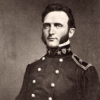Stonewall Jackson

Stonewall Jackson
Thomas Jonathan "Stonewall" Jacksonwas a Confederate general during the American Civil War, and the best-known Confederate commander after General Robert E. Lee. His military career includes the Valley Campaign of 1862 and his service as a corps commander in the Army of Northern Virginia, under Robert E. Lee. Confederate pickets accidentally shot him at the Battle of Chancellorsville on May 2, 1863. The general survived but lost an arm to amputation; he died of complications from pneumonia eight days later...
NationalityAmerican
ProfessionSoldier
Date of Birth21 January 1824
CountryUnited States of America
Our movement was a great success; I think the most successful military movement of my life. But I expect to receive more credit for it than I deserve. Most men will think I planned it all from the first; but it was not so. I simply took advantage of circumstances as they were presented to me in the providence of God. I feel that His hand led me - let us give Him the glory.
My religious beliefs teach me to feel as safe in battle as in bed.
I am more anxious than I can express that my men should be not only good soldiers of their country, but also good soldiers of the cross.
He is cautious. He ought to be. But he is NOT slow. Lee is a phenomenon. He is the only man whom I would follow blindfolded.
Arms is a profession that, if its principles are adhered to for success, requires an officer do what he fears may be wrong, and yet, according to military experience, must be done, if success is to be attained.
I was afraid the fire would not be hot enough for me to distinguish myself.
Sir! Men who desert their comrades in war deserve to be shot! And Officers who intrude for them deserve to be hung!
Always mystify, mislead and surprise the enemy; and when you strike and overcome him, never let up on the pursuit.
My troops may fail to take a position, but are never driven from one!
Press on, press on, men.
Under divine blessing, we must rely on the bayonet when firearms cannot be furnished
Madam, if your son were to come home and try to shirk duty, you ought to shut your door in his face and treat him as a renegade unworthy of your name or regard.
I yield to no man in sympathy for the gallant men under my command; but I am obliged to sweat them tonight, so that I may save their blood tomorrow.
Who could not conquer with such troops as these?